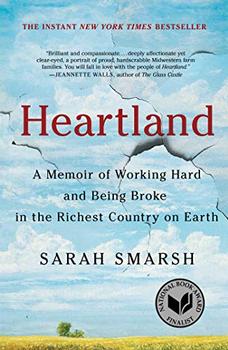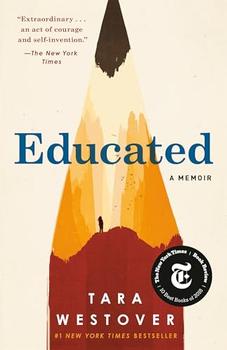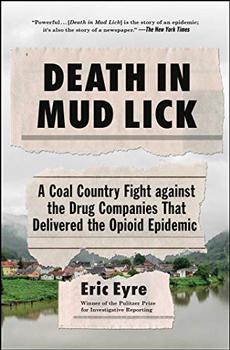Summary | Excerpt | Reading Guide | Reviews | Beyond the book | Read-Alikes | Genres & Themes | Author Bio

A Memoir of Working Hard and Being Broke in the Richest Country on Earth
by Sarah SmarshSarah Smarsh is the first woman in many generations of her family to rise above cyclical poverty and the conditions that perpetuate it. In Heartland: A Memoir of Working Hard and Being Broke in the Richest Country on Earth, which has been long-listed for the National Book Award, Smarsh recounts not only her own early life in poverty, but also the lives of the generations leading up to her own. For women, cyclical poverty means marrying and having children at a young age, which was true for Smarsh's mother and her grandmother. Poverty also means surviving on low wages, always just barely scraping by to the next paycheck and with no extra to spend on any of the means others may use to get ahead. This was true for her family too.
Driven by her family's backbone of self-sufficiency, Smarsh managed to become the first in her family to go to college. There, she came up against a new challenge, facing stereotypes that pegged her as "white trash" because of her humble upbringing. It was in those years that Smarsh began to understand the socio-economic divide that runs deep in the United States.
Now a fellow at Harvard's Kennedy School of Government, Smarsh uses her memoir to reflect on the societal and economic factors that contributed to her family's identity. Though some of the hardships her family faced had little to do with being poor, most originated with the systemic problems that plague those in the U.S. living in poverty. Many of these problems stem from the cultural divide between the haves and the have-nots: those with money are the ones making the laws, and in turn, laws tend to benefit people with money more than they do the middle and working classes.
Attitudes toward the working poor only serve to compound the problem. Smarsh writes:
Thus, we see attitudes towards poverty compounding the sting of poverty itself. To counteract this type of pervasive view, Smarsh writes with care about her own family, especially the women – her mother and grandmother – who endured so much. Smarsh explains them and women like them: "There is a violence to merely existing: the pregnancies without health care, the babies that can't be had, the repetitive physical jobs." Add to all of that the shame they endure; daily life in poverty is bogged down with innumerable humiliations.
Though Smarsh tells her story with grace and compassion, one structural detail stands out as a distracting oddity. Much of the book is addressed to "you." Blink and you'll miss the reason why. Smarsh is writing as if to her daughter, a person who does not and may never exist, because Smarsh has chosen to remain childless. Despite this idiosyncrasy feeling odd to the reader, it is not a narrative choice Smarsh made illogically. In addressing her non-existent daughter, Smarsh calls attention to one aspect of impoverished women's lives that often seals their fate: having children early and grappling with supporting them during the years middle- and upper-class women typically get ahead with education.
By not having this unnamed daughter, Smarsh has avoided the same fate. She has educated herself and achieved a great deal. But she is still plagued by the memories of the life she left behind. Now she truly understands that "class is an illusion with real consequences."
![]() This review was originally published in The BookBrowse Review in September 2018, and has been updated for the
October 2019 edition.
Click here to go to this issue.
This review was originally published in The BookBrowse Review in September 2018, and has been updated for the
October 2019 edition.
Click here to go to this issue.

If you liked Heartland, try these:

by Tara Westover
Published 2022
Winner of the 2018 BookBrowse Nonfiction Award
An unforgettable memoir about a young girl who, kept out of school, leaves her survivalist family and goes on to earn a PhD from Cambridge University.

by Eric Eyre
Published 2021
From a Pulitzer Prize–winning reporter from the smallest newspaper ever to win the prize in the investigative reporting category, an urgent, riveting, and heartbreaking investigation into the corporate greed that pumped millions of pain pills into small Appalachian towns, decimating communities.
Your guide toexceptional books
BookBrowse seeks out and recommends the best in contemporary fiction and nonfiction—books that not only engage and entertain but also deepen our understanding of ourselves and the world around us.